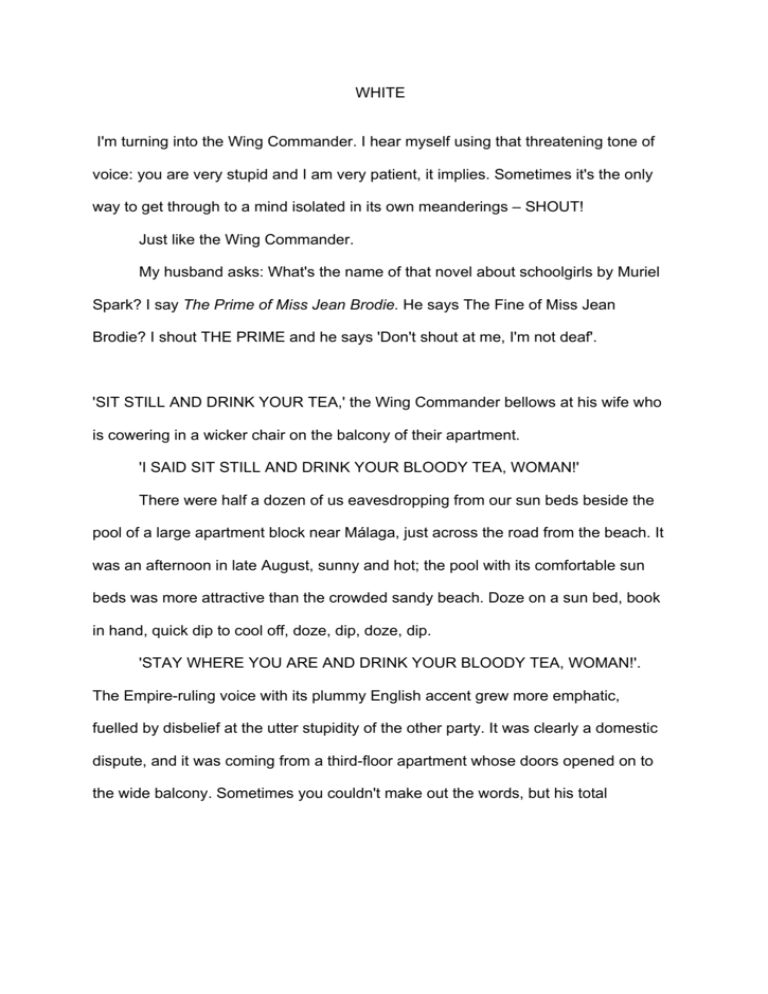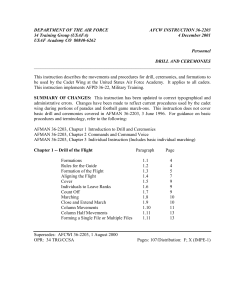White - Alannah Hopkin
advertisement

WHITE I'm turning into the Wing Commander. I hear myself using that threatening tone of voice: you are very stupid and I am very patient, it implies. Sometimes it's the only way to get through to a mind isolated in its own meanderings – SHOUT! Just like the Wing Commander. My husband asks: What's the name of that novel about schoolgirls by Muriel Spark? I say The Prime of Miss Jean Brodie. He says The Fine of Miss Jean Brodie? I shout THE PRIME and he says 'Don't shout at me, I'm not deaf'. 'SIT STILL AND DRINK YOUR TEA,' the Wing Commander bellows at his wife who is cowering in a wicker chair on the balcony of their apartment. 'I SAID SIT STILL AND DRINK YOUR BLOODY TEA, WOMAN!' There were half a dozen of us eavesdropping from our sun beds beside the pool of a large apartment block near Málaga, just across the road from the beach. It was an afternoon in late August, sunny and hot; the pool with its comfortable sun beds was more attractive than the crowded sandy beach. Doze on a sun bed, book in hand, quick dip to cool off, doze, dip, doze, dip. 'STAY WHERE YOU ARE AND DRINK YOUR BLOODY TEA, WOMAN!'. The Empire-ruling voice with its plummy English accent grew more emphatic, fuelled by disbelief at the utter stupidity of the other party. It was clearly a domestic dispute, and it was coming from a third-floor apartment whose doors opened on to the wide balcony. Sometimes you couldn't make out the words, but his total 2 exasperation was clear. He sounded on the verge of physical violence. His desperation reached a pitch that forced me to sit up and snap awake, fearing for the safety of his wife. I noticed others around the pool also sitting up, discreetly adjusting their position to get a better view of the balcony. 'IF I'VE TOLD YOU ONCE, I'VE TOLD YOU A THOUSAND TIMES, DO NOT MOVE! STAY IN YOUR CHAIR. SHE WILL BE HERE IN TEN MINUTES. TEN MINUTES! THE WOMAN WHO DOES YOUR HAIR WILL BE HERE IN TEN MINUTES. HOW MANY TIMES DO I HAVE TO TELL YOU? STAY WHERE YOU ARE AND DRINK YOUR BLOODY TEA.' I was not the only one to stifle a laugh. Once you could make out the words, the threatening tone of voice seemed less likely to lead to violence. He was obviously mad, but why did she put up with it? What hell were they living through in their sunny retirement home? We could see her, sitting in the shade, with a tray in front of her, a frail, blonde- haired woman with an anxious smile. She made a move as if to get up. 'STAY WHERE YOU ARE! DON'T MOVE! SHE'LL BE HERE ANY MINUTE NOW.' He was pacing up and down, in and out of the room off the balcony, a burly man with military bearing, receding grey hair and a moustache, dressed in a towelling robe. He was surely about to explode with suppressed rage. Shouldn't we do something? Perhaps he would turn violent. Was his wife in danger? Could we just go on lying in the sun, pretending to read, as it nothing was happened? The mahogany-brown woman on the bed next to me saw my worried look, 3 and said something reassuring in German. 'I'm sorry. English? Español? Francais? 'Don't worry, it's only the Wing Commander. He's mad, but he doesn't hurt her. Last year we tried to rescue the poor woman, some of us who live here. We couldn't go on, day after day, listening to it, not knowing what was happening to her. We visited her while he was out, and offered to look after her, but she begged and pleaded with us to leave her alone. She didn't want to be rescued. He is a Wing Commander with a distinguished war record. She is quite safe.' Later, when I became interested in such things, I learnt more about dementia. When couples have been together many years, one partner often fails to recognise the symptoms of the disease in the other. The Wing Commander did not see his wife as suffering from an illness; she was simply becoming more and more exasperating. Her usual self, only more so. Being unaware of the symptoms – inability to tell up from down, right from left, follow simple instructions, inability to remember what has just happened, nor what is about to happen, for example – he failed to recognise them. And because he did not know that her behaviour was the result of mental deterioration, he did not make allowances for it. And so his patience, which had probably never been great, was constantly at breaking point. Possibly he too was suffering some of the same symptoms. I saw them on Sunday, going out to lunch, like many another retired English couple, looking most distinguished, he in a pale beige suit and Panama hat, she following 4 three paces behind wearing a long kaftan and carrying, rather awkwardly, a large handbag. She walked with a cane, in a tentative shuffle. I didn't identify them until the man stopped in his tracks, turned around and bellowed: 'Come on, woman! Concentrate!' I wondered whether they had any grown-up children who might keep an eye on them. Whether, living as ex-pats on the Costa, they were within any network that might identify them as in need of help. But what could anyone do? Put them into a "home" – that is to say, an institution, where they would be safe but unhappy? The Wing Commander would have insisted he could cope, and he did, in his way. What I had taken for bad temper was in fact kindness. Ironically, that was the summer that my husband started showing the first symptoms of mental decline. How hard it is to write that, even years later. You'd think I'd get used to it, but no, it is the Great Unspoken. He knows, and he knows that I know, but we both pretend it isn't happening. Our cats know, the two black cats, sensitive as barometers; they can foretell imminent storms from a gesture of impatience, a tone of voice, and silently disappear. I should have realised something was wrong back on the Costa, when he started spending evenings on the sofa, laughing quietly to himself as he read through the Málaga phone book. He has always been eccentric; this was just a new form of eccentricity. I spent those same evenings reading a book in Spanish about a man and his horse – Platero y Yo – delighting in the strange vocabulary, laughing 5 with pleasure at the new words, looking them up in the dictionary and writing them down in a notebook on a page which I had divided into two by drawing a vertical line down its middle, just as I used to do at school. Perhaps I too am eccentric. Meanwhile, he was discovering names and addresses in the Málaga phone book so pleasing that he read them aloud: Pepe Rico, Calle de las Angustias; Claus y Hannelore Boykens, Miramar; Donal y Paulette O'Farrell, Edificio Carabeo…Just the names. The phone numbers did not interest him at all. Soon after he was diagnosed as mildly bi-polar, treated for depression, hospitalised when manic, depressed when he came home. I learnt very quickly that diagnosis of mental health is an approximate business. No one label seemed to fit him: like many people, he defied categorisation. I was advised to maintain a quiet regime. Regular meals, regular exercise, no suprises, no excitement. Sometimes he was silent for weeks. Soemtimes he spoke non-stop for forty-eight hours. When it became intolerable, I'd give him a Valium or two, and sometimes take a half myself. Then he went into a steep decline, and Parkinson's was suspected. Eventually he was given a bed in a geriatric ward. He shuffled in, a bent old man, unable to carry his own bag. The physician took him off the psychiatric drug, and 24 hours later he bounded out of the ward, walking like a young man again, carrying his own bag, full of stories of life among the oldies. Then came the bad news: a firm diagnosis of dementia. The GP looked at me with such compassion when he told me that it made me cry. 'The only good thing I can tell you is that it is not Alzheimer's Disease, the worst dementia. He will 6 not lose his personality. He has vascular dementia, he will decline in clear steps, and we can prescribe drugs that will postpone that decline. He will be his usual self, only more so.' Himself, only more so. Logic no longer works, because he does not think rationally, and I find this difficult, disorienting. His reactions are like those of a small child. Everything must happen right now. There is no such thing as patience. Sometimes it slips out, I can't help it, at an extreme of frustration I shout: 'You're acting just like a child!' It is the worst thing I can say. Because deep down he knows, and he knows I know… It helps if I remember to show affection, simple things like hugs and kisses. I hug and kiss him more than I would usually, and it pleases him. Must remember to show affection. Cold bitch. Termagant. My friend Jim, a psychotherapist, says that the problem with most of the people who come to him for therapy is not that they are mad; the problem is that they are not mad enough. I ask whether he calls them patients or clients, and he says he calls them 'people who come to me for therapy'. Jim has a sign up in his office (his inner office, not the one where he sees people): Nothing Right in my Left Brain. Nothing Left in my Right Brain. I know the feeling. Good days, bad days, up and down, or down and downer? You are never alone, yet 7 there is no company, no companionship, just his self-absorption. Constant monologues, always the voice, talking to himself when I am not in the room, or to the cats, that are better listeners than I am. Tears this morning in bed, just a little sob, all for too much for a moment. Bad. Then I take charge of myself again, must have no chinks. I was woken by a sharp kick on the shin, he was fighting in his sleep, dreaming, and thinks I shouldn't hold it against him, because he was asleep. He is right. I must have no chinks in the armour, leave no crack open through which he can get at me. I think of the village post office and petrol station that I drove past last night, dark blue shutters pulled down on all its windows, blank, invulnerable. I must make parts of me dead. Early next morning in bed he tells me his dream of painting a room white. I tell him about the Easter I spent as a student, painting my flat white, bedroom, kitchen, bathroom, hall, white, white, white, and when I wasn't painting white, I was reading Moby-Dick for an essay. All these words and adventures, the other-worldliness, the sea and sky and far horizon and the white-painting resulting in unusually vivid dreams, the best dreams I've ever had. And he remembers a time long before we met, when he too was painting a flat white, several coats of white, and while doing it accidentally hearing Messaien on the radio, and nothing had ever seemed so beautiful as white paint and the ethereal notes. Beautiful white! We hug each other tightly, clinging to the rare moment of contact. As in the bad times to come, I will cling to this memory, the calm and the solace of it, white, white, white.










